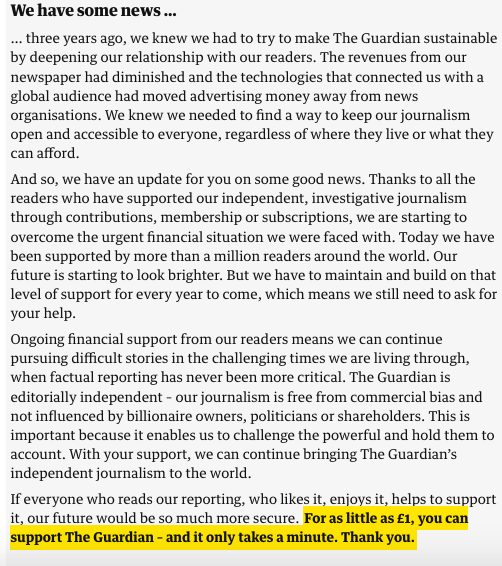Since the Guardian was launched in 1821 in Manchester, it has undergone a complete transformation.
Many still think of the publisher as a daily UK newspaper, but with recent digital developments, the Guardian has become a truly global multi-platform news organisation.
In addition to the print newspaper, which sells between 120,000 and 250,000 copies at the weekend with the Guardian Weekly edition, the Guardian website has approximately 10 million unique users a day.
Speaking at the Westminster eForum in December 2018, Matt Rogerson, head of public policy, Guardian Media Group, explained that the publisher started its transformation by transitioning from an advertising-reliant model to a more diversified revenue stream.
“The economics of the newspaper used to be pretty simple,” he said.
"We’ve always relied on advertising – the first edition of the Guardian had advertising on it for umbrellas and steam lathes. It was a form of targeted advertising because there was machinery from mill owners in Manchester advertised on the front page."
However, the advertising model for news organisations has been under threat for years. So in 2016, the Guardian decided to update its offering and launch a number of new subscription schemes.

Screenshot of the call for contributions on the Guardian mobile app
Firstly, the publisher created an app as a subscription offer for committed users. Although the organisation's content is free, the paid subscription of £5.99 a month gives users exclusive advantages such as live news and sport, and the ability to download news for offline use.
And, of course, crosswords.
However, the Guardian’s call for financial contribution from its readers is an experiment that has attracted a lot more attention.
In November 2018, the Guardian announced that it had received financial support from more than one million readers around the world in the last three years, with more than 500,000 paying to support the publication on an ongoing basis.
Readers are able to lend support to a series or reporting endeavour, or even support as part of a patron scheme, and some loyal readers have even left the publisher money in their will as 'legacy contributions'.
He explained that there was some scepticism about asking people for money without giving anything back – not even a branded merchandise.
“However, we realised our readers are pretty special and they want to see the Guardian succeed. So when we ask them to contribute to what we are doing, they are keen to do that," he said.
“The reason that we are able to engage readers and get them to give us money is because they really value the journalism that we produce.”
Speaking at newsrewired on 7 November, Amanda Michel, the Guardian’s global contributions director and product manager, gave her five lessons from what the team has learned over the past three years, constantly re-evaluating and talking to readers.
She explained the importance of making it easy for readers to contribute to the news outlet, and forming a team within the organisation to collaborate and test new models like this.
Free daily newsletter
If you like our news and feature articles, you can sign up to receive our free daily (Mon-Fri) email newsletter (mobile friendly).
Related articles
- UAE's The National uses free reader registration to counter the decline of SEO
- How to get started with user needs: learnings from the Reuters Institute, Metro.co.uk and smartocto
- Rachel Duffy, senior social media editor of The Telegraph, on using Reddit for news
- Journalism.co.uk reader responses: what we have learned so far from our audience survey
- Journalism must update its mission to survive










